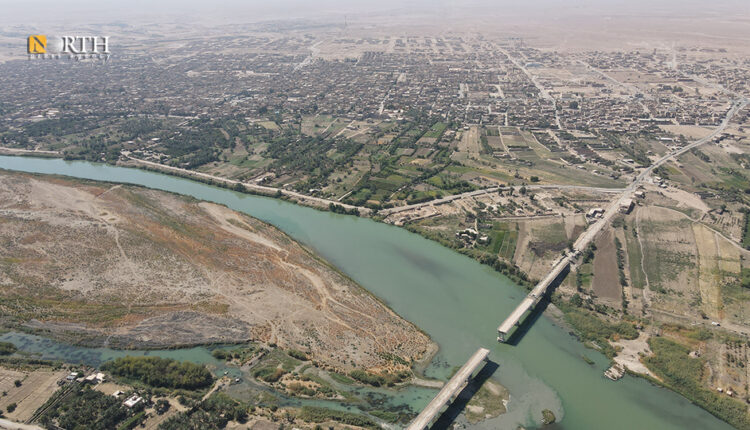
By Maher Mustafa
DEIR EZ-ZOR, Syria (North Press) – Ahmad no longer dared to go to his land located on the banks of the Euphrates River, eastern Syria, fearing arrest, especially after the recent escalation that occurred between the east and west of the River.
Iran-backed militias, government forces, and allied auxiliary forces control west of the Euphrates in Deir ez-Zor Governorate, while the Syrian Democratic Forces (SDF), a partner of the US-led Global Coalition, control the eastern areas.
Ahmad al-Ali, in his forties, a farmer from the town of al-Quriyah in the eastern countryside of Deir ez-Zor Governorate, used to cultivate his land with wheat, but he can no longer do so.
Preventing Access to Lands
Al-Ali says that he and his peers, who own farmlands along the Euphrates River, have been prevented from accessing their lands since the escalation began in Deir ez-Zor. “If we violate the decision, we face accusations of collaborating with the US-led Global Coalition forces and the SDF.”
Recently, the intensity of mutual shelling has increased between armed groups affiliated with government forces and Iran, and the SDF. Incidents of targeting US bases in Deir ez-Zor have also occurred, prompting the US to respond by launching airstrikes against Iranian positions in the area.
The shelling incidents have triggered a mass displacement of residents due to the fear of indiscriminate rockets and shells, especially since casualties has recently been reported in the region.
Al-Ali tells North Press that he will not be able to cultivate and irrigate his land, a crucial source of income. “No one can go to the banks of the Euphrates because snipers of Iranian militias target any movement or person approaching the River,” he added.
Military posts are positioned on both banks of the Euphrates. Militiamen repeatedly attempt to infiltrate SDF-held areas in east of the Euphrates to target SDF posts, al-Ali said.
Iran and the Syrian government have enlisted gunmen who previously fought against the SDF after it arrested Ahmad al-Khabil, also known as Abu Khawla, the former commander of the SDF-linked Deir ez-Zor Military Council. Abu Khawla had been accused of committing violations and abuses against the residents of Deir ez-Zor.
These militants are being led by Ibrahim al-Hefl, sheikh of the al-Uqaydat tribe, whom the SDF revealed to be residing in Damascus. Periodically, al-Hefl issues statements calling for fighting the SDF.
Government’s support for al-Hefl
Along with other locals, Khaled al-Jubeir, a resident of the town of Hawaij in the eastern countryside of Deir ez-Zor, evacuated to areas far from the Euphrates due to frequent indiscriminate shelling by government forces and gunmen affiliated with al-Hefl, targeting homes close to the river.
Al-Jubeir informed North Press that their homes have been looted and vandalized while they were away. Still, they are unable return due to the periodic shelling by government forces.
Since the beginning of November, government forces have targeted civilians’ homes and farmlands in areas under control of the SDF by more than 18 artillery and rocket shells.
Government forces support al-Hefl militants and facilitate their attacks against SDF posts by shelling with artillery and mortars.
Fear of Gunmen
Abdul Salam al-Rifaai, a resident of the town of Abu Hardoub in the eastern countryside of Deir ez-Zor, said that the residents now live in constant fear of militants crossing into their town at any moment, which is frequently accompanied by artillery shelling from government forces stationed on the western side of the Euphrates River.
A mortar shell fell on a house in the town which resulted in killing of four people. In addition, residents avoid approaching the riverbed for fear of militants, according to al-Rifaai.
He added that the majority of the village farmers cannot access their lands, which they rely on as a primary source of income. Furthermore, they encounter challenges in providing water for their livestock due to the increasing prices of water purchased from water tankers. The owners of these trucks are reluctant to fill them from the river due to concerns that their vehicles may become targets.
Activists in Deir ez-Zor voice their concerns about the military reinforcements of Iran-backed militias and their seizure of civilian homes, which are being used as launching pads for rockets aimed at areas east of the Euphrates. These activities have led to a widespread displacement of the local population in east of the river.
The attacks have worsened the plight of residents in west of the Euphrates, exacerbating their difficult living conditions and lack of basic necessities.
Activists assert that residents bear the brunt of the situation, experiencing the loss of seasonal crops, disruptions to their livelihoods, displacement from their homes, and encountering a state of chaos. In addition, residents in west of the Euphrates repeatedly face malicious accusations of collaborating with the SDF, which has resulted in forced disappearances.
As for the eastern side of the Euphrates, life almost comes to a halt for areas near the River, especially in towns like Shuhail, al-Busayrah, and Diban. Residents fear approaching the riverbed to irrigate their lands due to the risk of sniper attacks, according to activists.
